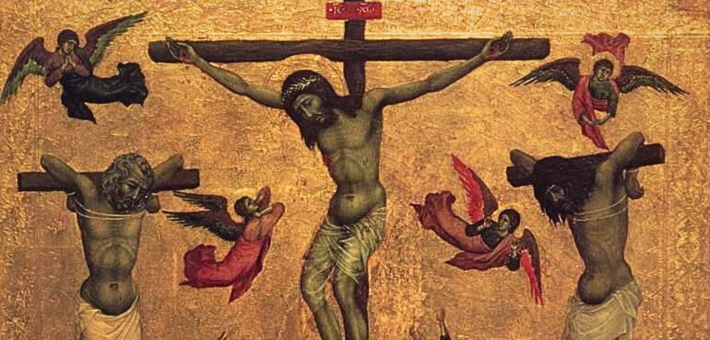Commentary on Exodus 3:1-15
In 1990, the multi-talented Bette Midler released an album entitled, Some People’s Lives. The seventh track on that album was a cover of Julie Gold’s song, “From a Distance.” In the midst of global conflicts like the genocidal Rwandan Civil War, Iraq’s invasion of Kuwait, and the Cold War, the ecological disaster of the Exxon Valdez oil spill, and the deathly HIV/AIDS epidemic, Midler’s “From a Distance” reminded listeners that God was not distant, but was invested in all of creation. Listeners were encouraged by the notion that God sees—even if from afar.
God is watching us
God is watching us
God is watching us
From a distance.
The same watching-from-a-distance God Midler sang about is a major actor in the book of Exodus. Often referred to as “the call of Moses,” the popular Exodus 3 passage signals a turning point in the life of an important biblical figure. Indeed, Exodus 3 is important, but its value becomes more significant when considered in context. Telescoping out a bit, readers may remember the Israelites are in Egypt because they sold themselves into Egyptian slavery in exchange for grain during a famine (Genesis 47:19). At the beginning of the book of Exodus, the Israelite hero Joseph dies, and “a new king arose over Egypt, who did not know Joseph” (Exodus 1:8). This new pharaoh fears the fruitful and prolific Israelites will overtake the Egyptians, so he encourages his people to deal harshly with the Israelites. Ruthless Egyptian taskmasters oppress the Israelites and ultimately the new pharaoh initiates a genocidal program focused on killing Israelite boys at their birth (Exodus 1:16). An Israelite boy named Moses’ life is spared, and he helps lead his people away from oppressive Egypt.
In the third chapter of the book of Exodus, adult Moses has a theophany while shepherding his father-in-law’s sheep. The word “theophany” is derived from two Greek words meaning “God” and “to show.” A theophany, then, is a manifestation of the deity.¹ Moses’ encounter with the burning bush in Exodus 3, Jacob’s wrestling with “a man” in Genesis 32, and Job’s interaction with the divine who speaks out of a whirlwind in Job 38 are all examples of theophanies. According to the writer(s) of Exodus 3:7-10, the Lord explains to Moses that as a result of observing the misery of the Israelites, this god will deliver them from the Egyptians and relocate them to a better place. As the story continues, Moses miraculously leads the Israelites out of Egypt, they enter the land of promise, and eventually establish themselves as a vibrant monarchy.
Then the LORD said, “I have observed the misery of my people who are in Egypt; I have heard their cry on account of their taskmasters. Indeed, I know their sufferings, and I have come down to deliver them from the Egyptians, and to bring them up out of that land to a good and broad land, a land flowing with milk and honey …” – Exodus 3:7-8
The Hebrew found in Exodus 3:7 is the infinitive absolute of the verb r’h (English “see”) with a first-person singular suffix. Of the two infinitive forms in Hebrew, the infinitive absolute expresses intensity, emphasis, or certainty of verbal action. Therefore, this phrase may be translated as my really seeing or my observing. The New International Version, Jewish Publication Society, and Common English Bible translate the phrase as, “I have indeed seen,” “I have marked well,” and “I’ve clearly seen,” respectively. In Exodus 3, God is not caught off guard, blindsided, taken aback, or startled by the condition of the Israelites who are living under pharaonic oppression. God has decidedly been paying attention. Importantly, even if God’s engagement has been beyond what is perceivable to the Israelites, God has been watching.
When the famine struck and the Israelites feared their demise, God was watching. When the Israelites exchanged their money for grain, traded their livestock for food, relinquished their land for nourishment, and eventually surrendered their very lives for sustenance from the Egyptian storehouses, God was watching. When the new pharaoh arose in the land and enacted policies that resulted in the Israelites suffering under harsh taskmasters, God was watching. When Pharaoh sanctioned the deliberate killing of Israelite boys, God was watching. God observed the misery of the Israelite people and took action. In all of this, God was watching … from a distance.
What might it mean for God to observe us from a distance? How might we live if we understood God was close enough to observe and act, but somehow far enough to remain out of our reach? We might not support policies and politicians that favor certain members of the citizenry at the expense of others, if we knew God was observing. We might spend our money differently if we believed God was watching us. We might not say hurtful things about one another if we believed God was at a distance. Moreover, how might we respond to the reality that the Lord is always at a distance? We might even pray differently and for different things if we earnestly believed God would hear our cries and act on our behalf. We might live differently if we understood God was watching just beyond our grasp.
At some point in the music video, Bette Midler sings, “God is watching us from a distance,” looks up towards the skies, smiles, and waves. It is as if she recognizes God in the distance. God is watching us. God is watching us, from a distance.
From a distance, there is harmony
And it echoes through the land
And it’s the hope of hopes
It’s the love of loves
It’s the heart of every man (every man)
It’s the hope of hopes
It’s the love of loves
This is the song for every man
And God is watching us
God is watching us
God is watching us
From a distance
Oh, God is watching us
God is watching
God is watching us
From a distance
Notes:
- “Theophany,” Dictionary of Biblical Imagery (Westmont, IL: IVP Academic, 1998), 857.


September 3, 2023